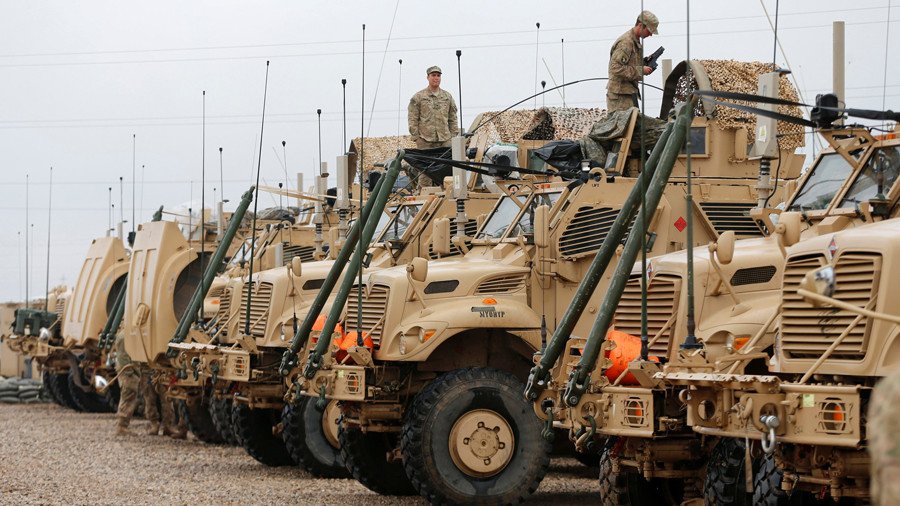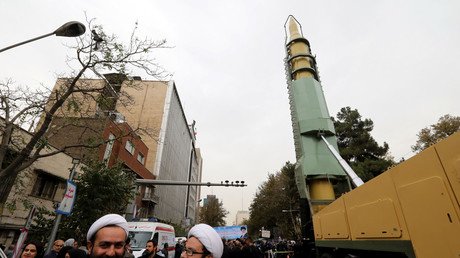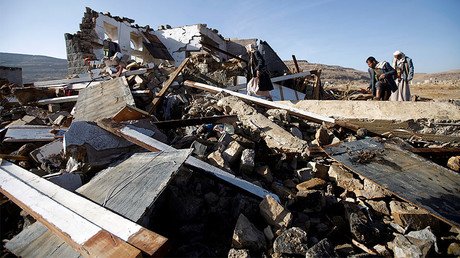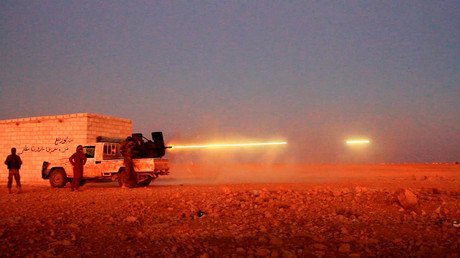US turned our region into ‘gunpowder depot,’ Iranian FM tells French counterpart

Iranian Foreign Minister Mohammad Javad Zarif said the US has turned the Middle East into a “gunpowder depot.” He was responding to his French counterpart, who accused Tehran of “destabilizing” the region.
France's Foreign Minister Jean-Yves Le Drian arrived in Iran on Monday to discuss the landmark 2015 nuclear agreement with top officials, including President of the Islamic Republic Hassan Rouhani, and the country's foreign minister.
Le Drian went on to accuse Tehran of applying a “destabilizing” influence in the region, apparently referring to the country's involvement in the Syrian crisis, as well as turmoil in Yemen, Lebanon, and Iraq. Firing back, Zarif reminded Le Drian that it was actually France’s transatlantic ally that destabilized the Middle East by pouring arms into the war-ravaged region.
“The United States and other countries that have turned our region into a gunpowder depot by selling arms must stop such actions,” Zarif said at the meeting, Iran’s IRNA news agency reported.
Later, he issued the same reminder to the Europeans: “[The] US and Europeans should stop pouring hundreds of billions of dollars of weapons into our region instead of questioning Iran's missiles,” Zarif wrote on Twitter. “Not restricted by UNSC, but necessary to deter repeat of our people’s suffering when Saddam – with Western support – showered us with missiles.”
The United States has continuously supplied opposition groups in Syria with arms, some of which eventually made their way into the hands of Islamic State (IS, formerly ISIS) terrorists and other extremist groups. The US, UK and their allies have also sold weapons to Saudi Arabia and the coalition waging war in Yemen. France, meanwhile, armed Saddam Hussein during the bloody 1980s Iran-Iraq war.
US & Europeans should stop pouring hundreds of billions of dollars of weapons into our region instead of questioning Iran's missiles. Not restricted by UNSC, but necessary to deter repeat of our people’s suffering when Saddam—with western support—showered us with missiles. 2/3
— Javad Zarif (@JZarif) March 5, 2018
Paris, just like its transatlantic partner Washington, claims that Tehran’s missile program violates UN Security Council Resolution 2231, which endorsed Tehran’s nuclear deal with the P5+1 states. Despite the French diplomatic maneuvering, however, officials in Tehran rejected Le Drian's proposals.
Europe needs to “play a more constructive role to preserve” the nuclear deal, Zarif told his counterpart during the meeting. He said that France “must put pressure on the United States to meet its commitments under the deal and not to allow it to present illogical and illegal demands.”
“Preserving the nuclear accord will prove to the world that negotiation and diplomacy are the best option for solving problems, while its collapse will signify that political negotiations are a waste of time,” Rouhani said in a statement after meeting Le Drian.
The nuclear deal, brokered by the US, UK, Russia, France, China and Germany, places limitations on Iran's controversial nuclear energy program in return for the lifting of economic sanctions. There was, however, no agreement among the P5+1 to push for any binding restrictions on Iran's ballistic-missile program, though the International Atomic Energy Agency (IAEA) has repeatedly confirmed Iran’s compliance with the agreement.
Think your friends would be interested? Share this story!















